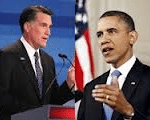![The 2012 Presidential Debates: When Moderators Aren’t Moderate]()
by | Aug 23, 2012
 Lost in the sea of coverage following Mitt Romney’s selection of Paul Ryan as his running mate, was the news that the moderators for the three Presidential debates, and one VP debate, were also selected.
Lost in the sea of coverage following Mitt Romney’s selection of Paul Ryan as his running mate, was the news that the moderators for the three Presidential debates, and one VP debate, were also selected.
There is a certain kind of news one receives that falls into the category of “this may or may not be bad—but it can’t be goodâ€. For Republicans, learning of the moderators that will be at the helm for these four debates certainly earns this distinction.
In order of appearance they are- Jim Lehrer (PBS News Hour), Martha Raddatz (VP Debate-ABC News), Candy Crowley (CNN), and Bob Schieffer (CBS News).
Since the Romney campaign had to sign off on each moderator, it is hard to imagine that they could not have demanded better (even given that the Obama camp also had to sign off on each). By any measure, Jim Lehrer, Candy Crowley, and Bob Schieffer all lean to the left, and the networks that employ them all trail badly in the ratings to their direct competition.
Even if you were to say that these three were the fairest that both sides could agree to, giving a green light to Martha Raddatz for the VP debate was certainly inexplicable. The reason for this being, she is a “foreign affairs correspondent†which is not Ryan’s forte, and in fact he was brought into the race for his economic mastery. One has to wonder how much focus will be put on non-domestic topics just based on her area of expertise. On the surface this seems a major concession to the Obama campaign, and one that needed not be given.
The reason these moderators are so important is three-fold. First, with all the polls showing that the election has a likelihood of being razor-close, every small detail that goes into them has a chance to be huge. Second, like was the case with the Republican Primary debates, these four showdowns will smash records for viewership and the audience will include millions of Independents sizing up the candidates for the first time. Lastly, and most importantly, the questions asked of the candidates have the ability to dominate the crucial weeks of news cycles leading up to Election Day.
So What Should The Focus Be?
Poll after poll shows that for the American people ground zero in this election is the economy. A Pew Research Poll taken from June 7-17 asked voters to name the top issue that they will be considering in the voting booth in November. The top four answers were Jobs (35%), the Budget Deficit (23%), Health Care (19%), and Social Security (11%).
The danger in having biased moderators was on full display for the Republican Primary debate moderated by George Stephanopoulos, when, seemingly out of nowhere, he felt the need to drill down with Mitt Romney and Rick Santorum on the issue of female contraception. This gave birth (no pun intended) to the Sandra Fluke phase of the campaign and a multi-week sidetrack by the media away from the serious issues of the day. There is simply no doubt that, should they choose to, a moderator can actively push the focus to issues that are not widely being considered by voters—and into territory that favors one candidate or another.
As will be the case in October, it just so happens that the issues voters themselves say are paramount are the exact issues that President Obama is desperate to avoid talking about. In theory this would make the debates a huge opportunity for Romney and Ryan to drive home their message—something tells me it won’t quite go down that way.
Perhaps I will be proven wrong, but will these moderators have the gumption to ask President Obama why a myriad of the promises he made while running in 2008 have been unachieved or even un-attempted? Will they remind the American people that twice the President had budgets voted on by Congress, and he failed to receive one solitary vote for either of them? Will they ask why he promised to cut the deficit in half but instead oversaw three years of trillion dollar plus deficits? Or will they inquire why he has not laid a plan on the table for reforming entitlements, after saying himself this was crucial in 2008?
Republican Are Right to Be Nervously Skeptical
All things being equal, and according directly to the polls, the topics discussed during all four of the debates should almost exclusively be jobs, the deficit, the long term health of entitlement programs, and foreign policy. What I fear instead is painful subjection to multiple questions on gay marriage, abortion, contraception, and student loan debt— knowing all the while the fruit is rusting on the vine.
It is true that the level of professionalism that the four moderators will show is yet to be determined, and perhaps at least three of them will be fair (I hold no hope for Bob Schieffer). But given the track record of behavior the major media outlets have shown to Republicans in recent years, I’d say a mildly-crippling nervousness is more than justified.
After all, barring a phenomenal performance by both Republican candidates, one thing is certain—“it may or may not be bad…but it won’t be goodâ€.
The post The 2012 Presidential Debates: When Moderators Aren’t Moderate appeared first on The Conservative Reader.



![The 2012 Presidential Debates: When Moderators Aren’t Moderate]()
by | Jul 1, 2012
 In a Representative Democracy, voting for a particular political candidate or philosophy is the most impactful way a citizenry can change their country. While the “who†a person votes for is what actively shapes a Republic, digging into the motivation behind that vote is far more telling, and ultimately reveals far more about ourselves and where we are heading.
In a Representative Democracy, voting for a particular political candidate or philosophy is the most impactful way a citizenry can change their country. While the “who†a person votes for is what actively shapes a Republic, digging into the motivation behind that vote is far more telling, and ultimately reveals far more about ourselves and where we are heading.
As government involvement in Americans day-to-day lives has expanded, the possible motivating factors at play driving each citizens vote has also expanded—and the effects of this have been devastating. Boiled down to the most basic level, there are two motivations that influence a political vote—you can vote in what you believe is in the best interest of the country, or you can vote in your own personal interest.
In past generations, before the American government was so deeply involved in the giving business, the vast majority of our population largely had only the best interest of the country as a whole to consider. Unfortunately, today nearly half of our citizens have the legitimate option of choosing to vote for their own personal gain at the ballot box.
Not Your Grandfather’s Democratic Party
Though it sounds crass, the modern day Democratic Party has evolved into a selfish group of constituencies that have something to gain in voting for Democrats and against Republicans. While the most obvious entries on the list involve financial assistance from the economic safety net—unending unemployment benefits, housing subsidies, food stamps, Title 19, etc.—in recent years this list has grown to include several other things.
Hispanic Americans can now vote Democrat to ultimately allow their friends and relatives who are here illegally become citizens. Gay Americans can now vote Democrat to gain the right to marry and the economic advantages that come with it. Union members can vote Democrat in order to receive more favorably negotiated salaries and benefits at the bargaining table. Those Americans who, for whatever reason, did not have health insurance can now vote a straight Democratic ticket in hopes of retaining it, since they have now been given it.
In large part this massive constituency of selfishly driven voters explains what the mind-boggling national debt has become so out of control. Far more than any other issue, not running annual deficits and paying down the national debt are two things that are in the best interest of the country—and not necessarily in the best interest of each individual American.  The polling data bears this out showing that, even with the national debt north of $16 trillion, only 66% of Democrats cite lowering this number as a major priority.
Contrarians to this line of thinking will make the charge that Republicans vote in their own best interest by voting for politicians who believe in lowering their taxes. As usual this charge leaves out one unavoidable fact—that the money taken by the government for taxes is earned, and it belonged to the individual in the first place. Put simply, voting to keep more of your own money and not giving it away to a largely wasteful entitlement state (especially one with a progressive tax code) is not a greed driven motivation—rather it is a logical one.
What It Means
The selfishly motivated voter is the single biggest reason why European style democracies are self-feeding, self-defeating, unworkable, and unsustainable. Yet in spite of the real-time evidence playing out across the Atlantic, a near majority of Americans refuse to change course. Increasingly, it is hard not to assume a major reason why American voters are unwilling to do so is that they would be putting themselves out to do so.
The only way to break this cycle is for the Democrat Party to shift away from promising things to an ever-widening group of voters. The sad truth though is that they have built a political base only able to stand upright through some combination of deficit spending, large tax increases, and social pandering. They have become so politically dependent on various sub-groups that making decisions for the economic good of the country, even if they wanted to, would quickly result in them paying a huge political price and losing elections.
Whenever Americans choose to overlook our national interest and instead vote in favor of their own, neither is well served.
The post In the Age of the Selfish Voter appeared first on The Conservative Reader.




by | Jun 18, 2012
 Preparing for the Supreme Court Fallout
Preparing for the Supreme Court Fallout
With the Supreme Court ruling on the Affordable Health Care Act expected within the next two weeks, both sides of the isle are busy making contingency plans. Two things of specific note here are:
- This decision will directly affect the next session of the Iowa Legislature. As of this moment the General Assembly has delayed setting up the insurance exchanges that are required in the health care law. If the law is upheld there will be mounting pressure on Iowa Republicans to begin this process quickly, and they will be forced to decide to either design the exchanges in order to have a say in how they are built, or take no action and risk having Iowa being governed by the exchange that the Federal government constructs.
- The decision’s details will have a great impact on our health care system as it pertains to the expansion of Medicaid. The working theory is that, as long as the whole law is not thrown out, the expansion of Medicaid that would put at least 16 million new people on the Medicaid roles would remain in effect. In this scenario action by Congress would be required to reverse this new reality. This highlights the importance of Republicans winning both the Senate and the Oval Office in November, regardless of the Supreme Court ruling.
    New York Times: With Justices Set to Rule on Health Law, Two Parties Strategize
An Early Analysis of Iowa in November
Take a look at the infrastructure the Obama and Romney campaigns are building in Iowa, and some of the factors at play in a crucial swing state.
Among some of the interesting things dealt with here are how having Steve King and the judicial retention elections on the November ballot will affect the Presidential race.
Slate: The Psychological State of IowaÂ
A Disturbing Sign of the Times
One wonders how long our Country can prosper while producing citizens capable of the following behavior–and having a social safety net that makes it possible.
Unbelievable and Despicable:Â News Channel 3 (Memphis): Memphis Man Owes Child Support to 15 Women
Even More Unbelievable and Despicable:Â News Channel 3 (Memphis):Â Tenn. Man “Fathers” 30 Kids But Can’t Support AnyÂ
![The 2012 Presidential Debates: When Moderators Aren’t Moderate]()
by | Jan 3, 2012
 We will have results of tonight’s caucus available here at The Conservative Reader as soon as the information is available from the Republican Party of Iowa. Â We will have a Google map setup showing the results in near-real time as results are tabulated starting at 6:00 PM. Â Be sure to attend your caucus, then check in with TCR for caucus results tonight and analysis on Wednesday.
We will have results of tonight’s caucus available here at The Conservative Reader as soon as the information is available from the Republican Party of Iowa. Â We will have a Google map setup showing the results in near-real time as results are tabulated starting at 6:00 PM. Â Be sure to attend your caucus, then check in with TCR for caucus results tonight and analysis on Wednesday.



![The 2012 Presidential Debates: When Moderators Aren’t Moderate]()
by | Dec 22, 2011

“After carefully considering the whole situation, I stand with my back to the wall. And walking is better, than running away…and crawling ain’t no good at allâ€
Willie Nelson—Lyrics to “Walking†(1974)
While not known for his astute political analysis, with these lyrics Willie Nelson has managed to perfectly describe the conundrum myself and millions of other voters face in selecting a candidate to support for president amongst the Republican field.
For months now GOPers have been carefully considering the whole situation, and have yet to settle on anyone. With the voting only two weeks away a majority of those undecided now officially are standing with their backs against the wall.
In this regard I am no different—laid here are the reasons I am currently walking, and not running, toward Newt Gingrich. Like any well thought out decision there are three main factors at play—the mind, the gut, and the legitimate reservations. The following is an honest, pull-no-punches account of my thought process for each.
The Mind
The reason why the polls have been a roller coaster in this cycle is fairly simple—you have a massive pool of Conservative voters and not one single, unquestionably consistent Conservative, who could certainly beat President Obama. My sense is that the field does have strong Conservatives, namely Bachmann and Santorum, but neither have been able to garner the support necessary to win the White House—and Ron Paul will have to be addressed in full at some other time. As the polls suggest, the two with the best chance at unseating Obama are Newt Gingrich and Mitt Romney.
This being the case, the exercise has come down to a question of who I feel is more Conservative between the two and who has the better chance of successfully vocalizing Conservative philosophy to the general electorate. On both counts my answer is Newt Gingrich. As we have seen in the Republican primary, the debates between President Obama and the Republican nominee are going to be viewed by a record amount of people and will largely be the deciding factor for Independents.
Perhaps no figure in modern political history has more of a gift for the debate stage than Newt Gingrich. Making this an even larger advantage is the mythic narrative that President Obama is some legendary debater. While last cycle he may have gotten the better of Hillary Clinton and John McCain overall, he never blew either off the stage (and managed to lose to both on multiple occasions).
Along with his debate prowess, there are two other things that make me comfortable with the idea of Newt as the nominee and as President. First is his deep understanding and respect for history. Whether it be American or world history, his decision making process would be solidly grounded in the actions and outcomes of past situations. I happen to think that had the filter of history been applied to many of the decisions made by our last two presidents, many of the undesirable results we have seen could have been avoided.
Second is the structure and proven results of the concept of a “Contract with Americaâ€. The 1994 contract saw roughly 70% of its content become law—and that was with a Democrat in the White House. Any Republican taking a serious look at his “21st Century Contract with America†would likely agree that achieving even 50% of its content would result in our Country standing on immensely more solid ground than it is currently. Clearly there is no time now to go through the platform item by item, however, you can review it in detail or read a brief highlight of it here. It is only fair that serious Republicans inspect this document before discounting Mr. Gingrich.
The Gut
The biggest source of apprehension I have toward Mitt Romney is his striking similarity to our 43rd president. George W. Bush’s eight year application of a watered down “compassionate Conservatism†did a great deal of damage to the viability of the philosophy. I can’t help but shake the feeling that when inevitably faced with unpredicted situations, a President Romney would not be guided through these times of crisis by Constitutional Conservatism. Instead I see him falling back on the identical political pragmatism that Mr. Bush turned to when the pressure was on.
While certainly not without its own risks, I also prefer Gingrich’s personality to Romney’s in the area of foreign policy. My view is that in general, and especially with the Iranian nuclear situation, many of America’s national security interests can be forwarded through an aggressive posture. Though it is a fine line to walk, putting a reasonable fear into rogue nations could—as proven by Reagan—actually help us avoid potential conflicts. A Romney-foreign-policy approach would likely be strictly by the book (i.e. painfully cautious and deferential), and result in a more-of-the-same outcome. Though I see positives in both approaches, I feel our enemies would have a greater fear of (and hence a greater respect for) a President Gingrich.
At a time when a dramatic move toward the Right is a legitimate possibility, on nearly every issue Mitt Romney is far too timid for my taste. One perfect example is in the area of Federal income tax policy. The enthusiasm throughout the country for major tax reform has never been greater, yet in this climate the proposal offered from Romney is to keep the top rate at 35% and largely leave the current structure intact. Though it could use some tweaking, the Gingrich proposal is for an optional 15% flat tax, where each taxpayer could choose to use the old system or opt for the flat rate. This is emblematic of the level of change the former Speaker is willing to push for—and the type of transformation Mitt Romney will never champion.
The Reservations
The fact that a voter would have reservations about their candidate is only natural. Having said that, the lengthy nature of his list points to why I am walking, and not running, toward Mr. Gingrich.
According to my television and mailbox, and no doubt yours too, not only should Gingrich be checked off our short list—he should be arrested and checked in to Guantanamo Bay. These attacks are largely overblown rubbish, but there are three main factors I view as legitimate reasons for apprehension. Like Romney, Newt’s career includes multiple examples of unsettling “political flexibilityâ€, his past personal life has often been a mess, and a rather large number of his former Republican colleagues have been outspoken against him (noteworthy on this list for me is Tom Coburn, whom I respect greatly).
Quite honestly these things have made the decision a far more anguished one than it has been in the past—or that it ought to be I might add. If I insisted on taking solace it would be found in the fact that while both candidates I view as being able to win the nomination and defeat President Obama have strong negatives—both would be an upgrade for the Country.
The Conclusion
I personally want the Republican Party, and the Country, to move significantly to the Right. I want the 10th Amendment to be respected, the enumerated powers to be followed, and for personal responsibility to once again be required and not optional. I do not see Mitt Romney doing this to the extent I want. In my eyes Newt Gingrich is, as George Will says, the most Conservative candidate who can win.
Like it will for many voters, my decision largely came down to a risk vs. reward ratio—and there is no doubt in my mind that Mitt Romney would be the safer choice. Given the circumstances, what America needs right now is a real and powerful constraint on Federal power. Of the nationally viable candidates, Gingrich—and the 21st Century Contract—comes the closest to my vision of a positive American future…For this reason I am willing to roll the dice.
Photo courtesy of Dave Davidson, whose outstanding work can be seen at Prezography.com



Page 9 of 10« First«...678910»
 Lost in the sea of coverage following Mitt Romney’s selection of Paul Ryan as his running mate, was the news that the moderators for the three Presidential debates, and one VP debate, were also selected.
Lost in the sea of coverage following Mitt Romney’s selection of Paul Ryan as his running mate, was the news that the moderators for the three Presidential debates, and one VP debate, were also selected.



